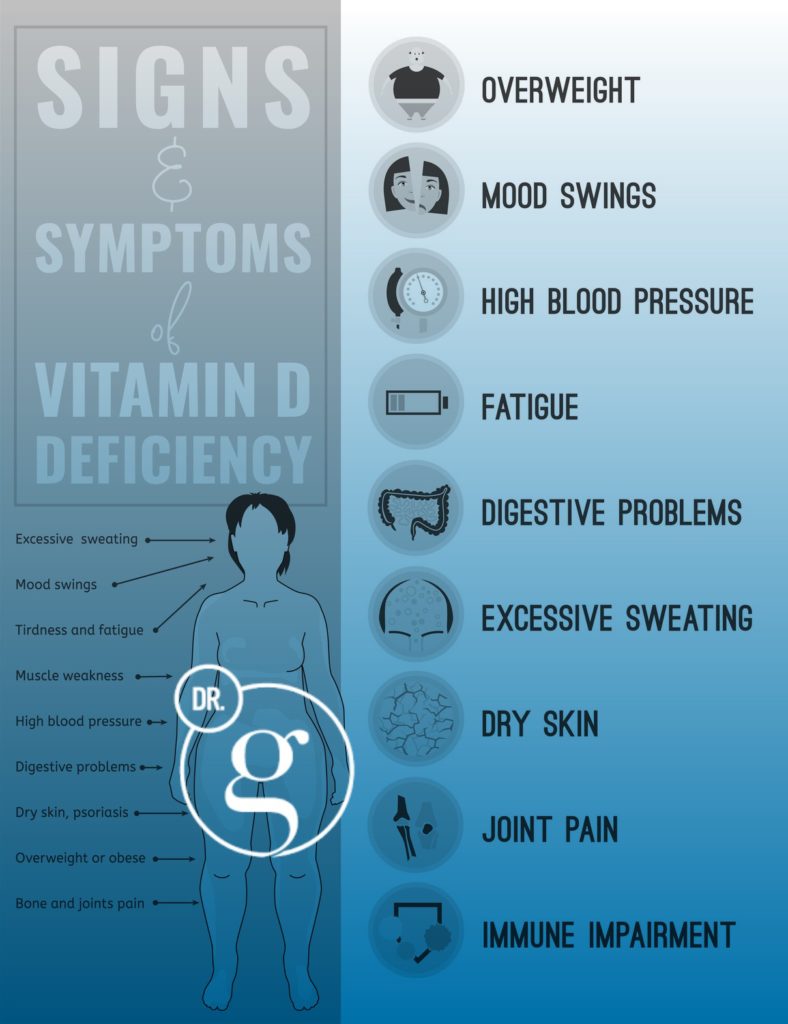

Vitamin D Update: What you need to know
Posted on September 15, 2018 by Dr. G
What does it mean to be sufficient.
Vitamin D is a topic we’ve discussed before but its worth updating and revising. Vitamin D sufficiency is technically defined by having enough vitamin D to carry out all of the vitamin D needs you have. This can vary from person to person. Vitamin D levels in your blood can be impacted by:
- Genetic variants
- Geography
- Immune reactions
- Inflammation.
- Nutrition
- Hygiene
- Skin color
- Sun exposure
Vitamin D sufficiency levels can change, for example if you have a chronic immune system challenge like a chronic infection, autoimmune disorder or cancer, your vitamin D needs increase. These conditions can also contribute to driving your vitamin D down.
Vitamin D, why are we so deficient?
Vitamin D is known as the sunshine nutrient. With all of the time we spend indoors, It’s not a stretch to recognize that you are probably not getting as much sun as you are designed to get or that your ancestors got in the days before the invention of the light bulb. For most of us, supplementing vitamin D based on lack of sunlight alone is a must.
For others impacted by the public health advice of the past 4 decades to hide from the sun or protect your skin from any amount of sun with maximum SPF protection, supplementing vitamin D is also a necessity. Not heeding that antiquated advice is also a must. Hiding from the sun has been shown to be as big a risk factor for cancer as smoking (show this to your dermatologist)
Are you too clean?: Personal hygiene can contribute to Vitamin D insufficiency.
Let us assume you are getting enough ‘unprotected’ sunlight hitting your skin stimulating the adequate production of vitamin D, there is still a good chance you are not sufficient in your blood levels of vitamin D. Vitamin D is produced by stimulating a chemical reaction that begins on the oily layer of your skin. A process of turning cholesterol into vitamin D3 over a period of several steps over many hours.
In our culture, for good reason, we have found being hygienic and clean to be a very good idea. Most of us shower on daily basis, especially if we spend a good deal of time outdoors working, doing chores or just spending the day at the beach. After all we do not want to ‘offend’, so we use a lot of soap all over our bodies and what does soap do to the oily layer on our skin? It strips it away sending much of the vitamin D producing benefit down the shower drain.
My clinical and academic experience tells me….
After many years of ordering comprehensive blood panels on thousands of my patients, it is more common than not to find suboptimal vitamin D levels in my patient population. Especially since what is considered sufficient by your laboratory is far from optimal.
A little history
Vitamin D is technically a hormone misnamed a “vitamin” many years ago. It was thought for decades (and till this day by physicians not aware of current science) that the major and only significant role of vitamin D is bone formation. In the 1950’s it was determined that a minimum level, 400 iu of vitamin D, is needed to prevent a 3rd world disease of bone formation in children called rickets. While bone formation is a key and important role of the hormone we call vitamin D, its primary function in the body is immune system regulation.
Vitamin D and your immune system: Anti Aging
If you are wondering what is so important about the immune system. Think about your daily defenses against viruses, bacteria, parasites, yeasts, foreign food proteins, allergens, etc. The immune systems is the ‘military’ of the body. Our understanding of the ‘military’ or immune system is typically centered around ‘fighting’. We should also think of the immune system when recognizing the daily routine maintenance and repair role the immune system plays in recycling old and dysfunctional cells and cellular ‘machinery’ with new ones. The maintenance and repair role of the immune system (kind of like a sanitation and DPW role) in the body is also known as “anti-aging”.
Vitamin D is a 5 star general in this important ‘military’ role the immune system has in your body. The role of vitamin D cannot be overstated in protecting us from autoimmunity, infection, cancer, allergies, aging, obesity, chronic inflammation, heart disease, osteoporosis, neuro-degeneration and more.
How much should I take?
Seeing a doctor who can assess your genetic variants related to vitamin d, check your blood levels in the context of your medical history, and recommend how to get to optimal status is best way to go. The truth is conventional medicine practitioners are simply not trained to understand your needs based in the current accepted science. It has been my experience that vitamin D is too often ignored, or the myths surrounding vitamin D toxicity prevent proper assessment and recommendations to optimize your vitamin D.
All I can say is, for the past decade I have had numerous cases of chronic immune challenged patients (cancer, lyme, MS, autoimmunity, hypothyroid, etc) present to me with woefully low blood levels of Vitamin D after being under care of their physicians for months and years. Someone is asleep at the wheel.
Please share this article with anyone you feel may want to know more, leave comments or ask questions. Thank you.






